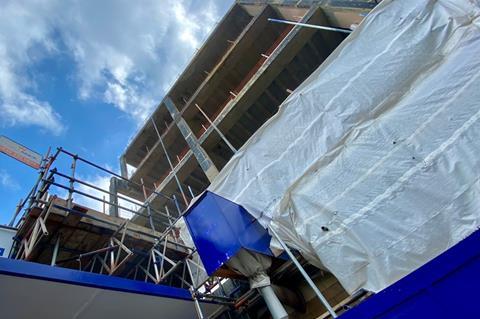Firm says some bigger new build jobs being stalled for up to a year by gateway 2 checks
McLaren has begun drawing up proposals to break the logjam of high-rise residential schemes stalled by the Building Safety Regulator not giving them sign-off under new legislation.
As part of the Building Safety Act, three new safety checks, known as “gateways”, for all new high-risk buildings – defined as 18 metres or at least seven storeys tall – have to be signed off by the regulator.
The first check is before planning consent, a second one before construction can start, known as gateway 2, and then a final check at delivery just before the building can be occupied.

The BSR is obliged to decide remediation projects at gateway 2 within eight weeks and new-build schemes at the same phase in 12.
But the issue of the regulator having enough and competent inspectors has meant these timescales are not being met with schemes weeks and months behind schedule.
>> See also: What the delays at the Building Safety Regulator mean for high-rise development
Building has been told the developer on one scheme, submitted to the BSR last July and validated the following month, was only told late last month, six months on, that gateway 2 sign-off had been held up because it had submitted too much information.
McLaren chief executive Paul Heather said: “The impact of the approvals process for gateways 2 and 3 is delays of six to 12 months on new builds. These delays are creating significant cost impacts, causing investors to hold back finance and, in some cases, are making projects unviable.
“One way to maintain viability on larger schemes with multi-million pound investment could be to introduce a building safety pre-application procedure akin to the pre-application process in the planning system. These pre-apps would be funded by the developers, helping the Building Safety Regulator to resource the process.”
Heather added: “There is no question of watering down the new standards. Developers and their professional teams have the capability to design and develop buildings in full compliance with the enhanced regulatory framework.
“[But] a pre application consultation process would allow the project team to resolve any project-specific regulatory interpretation, progress design to RIBA stage four and apply with confidence. It would de-risk the application process, maintain the flow of finance to the sector and aid in delivering targets set by government for accelerating development.”
Among those raising concerns recently have been developers Unite and Quintain as well as the trade body for piling specialists which has warned its members are deferring investment decisions while others are looking at lay-offs.




























No comments yet